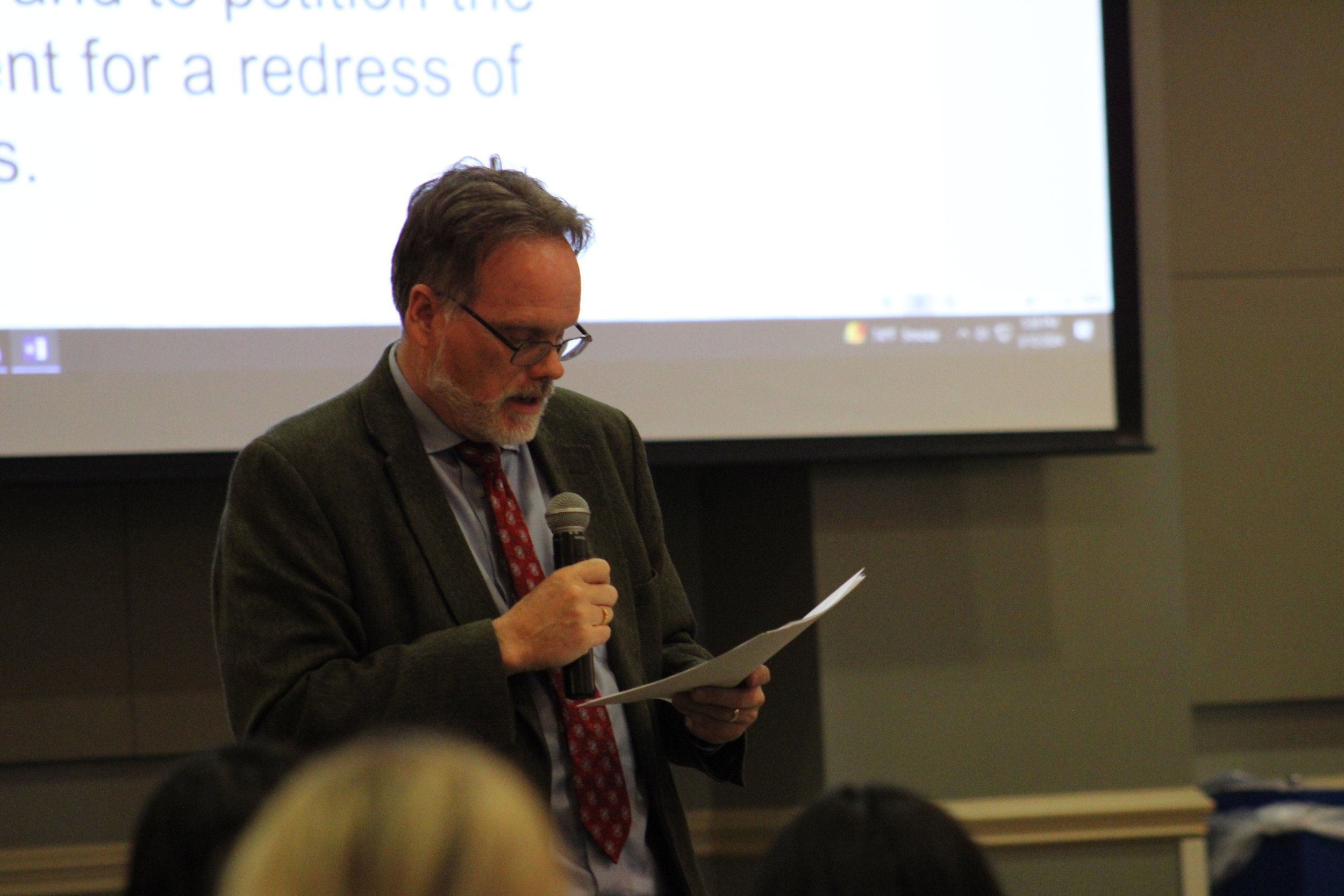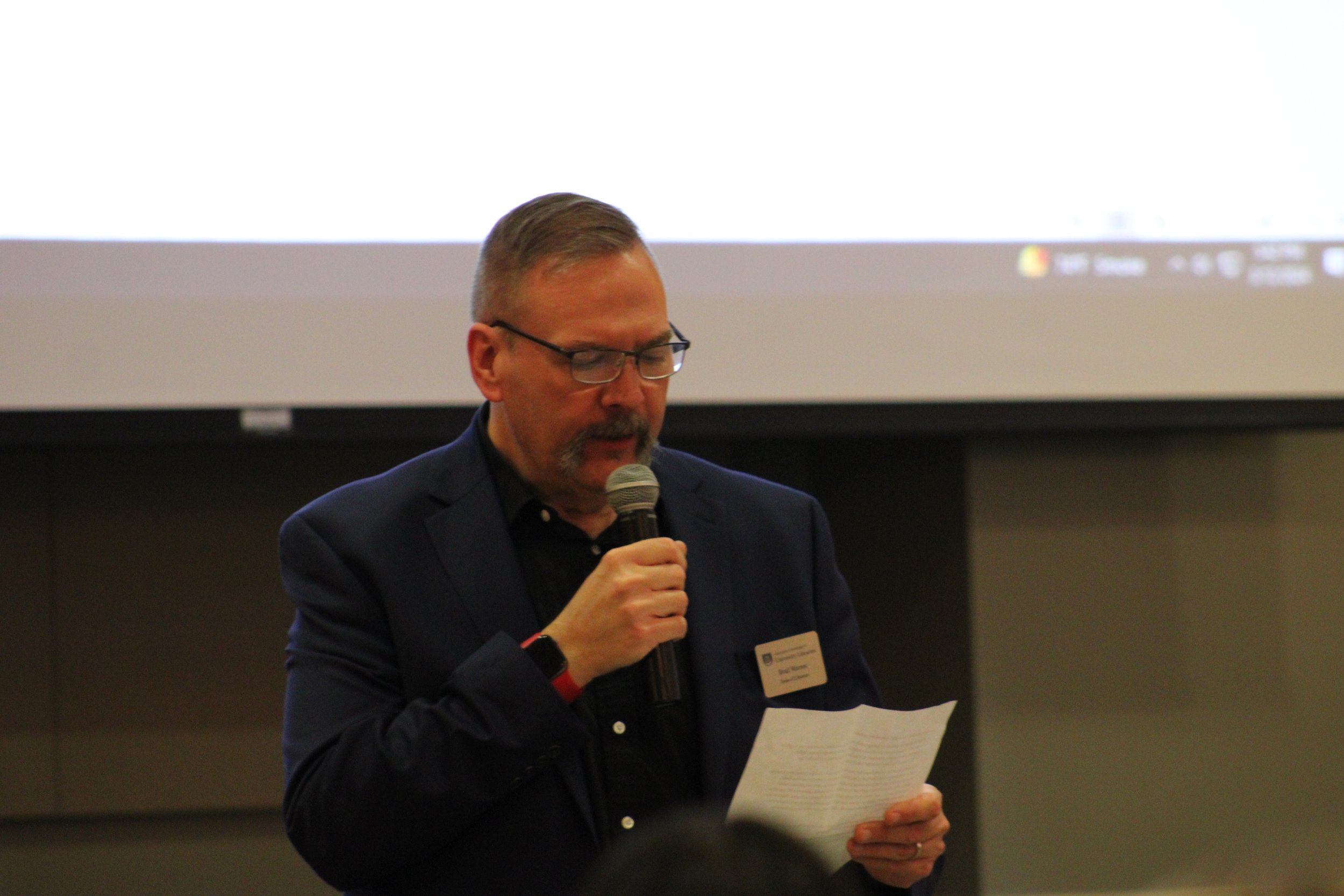Here's how Augusta University recognized 'Sunshine Week'
Lee Rowland, executive director of the National Coalition Against Censorship, was presented with a Champion of the First Amendment award on March 12. At top of page, David Kearns of the AU Libraries helped emcee the lecture; here is shown with Rowland. (photos by Rakiyah Lenon)
Department of Communication Chair David Bulla. (photo by Rakiyah Lenon)
By Rakiyah Lenon | Editor in chief
In recognition of National Sunshine Week, Augusta University hosted its annual Future of the First Amendment Lecture in the JSAC Ballroom on March 12.
Held this year on March 10-16, Sunshine Week aims to encourage Americans to educate themselves on the right to information and First Amendment freedoms. Libraries, schools, news media and other non-profits often participate in the nationwide annual event.
Lee Rowland, keynote speaker and executive director of the National Coalition Against Censorship, presented a lecture entitled “First Amendment 2.0: Speech and Censorship in Our Digital Age.”
Dean of Libraries Brad Warren. (photo by Rakiyah Lenon)
Rowland said historically, streets, sidewalks and public parks have long been places of public forum and democracy. She explained that the idea surrounding these forums have broadened, as the internet and social media has become commonplace in regards to First Amendment protections.
“The internet is in some ways a hybrid forum,” she said.
“It is both a common carrier and a place,” Rowland said. “It is the first time we had anything in communication that is fundamentally both.”
Rowland, a former lawyer, mentioned various legal discussions contribute to the country’s understanding of the First Amendment and the rights it entails.
“None of these rights just fell into place naturally,” she said. “They actually took the work of activists – legal scholars.”
Rowland said it is up to the public to weigh in on internet and digital policy, instead of leaving everything to the judicial system.
“Our duty is to actually care about the internet,” she said.
Speaking specifically of colleges, Rowland said respectively, students’ rights of speech have maintained strong protections.
Communication Assistant Professor Dylan Wilson, a photojournalist, asks a question at Future of the First Amendment Lecture on March 12. (photo by Rakiyah Lenon)
“The courts have rightly seen college students as fully entitled to the full range of First Amendment rights for adults,” she said.
Rowland added, “When it comes to online content, when it comes to students’ rights to speak, those are completely hand in glove—completely the same as the broad First Amendment rights that we all enjoy.”
Rowland said time and future precedents will aid in determining clearer ways to view the internet’s and social media’s place within First Amendment rights.
“As we work out more of the laws that applies to these hybrid public/private spaces, we could see an interplay with how the court assesses First Amendment rights on college campuses,” she said.
Audience recites the First Amendment at the Future of the First Amendment Lecture on March 12. (photo by Rakiyah Lenon)
The event was sponsored by the AU Libraries in coordination with the Pamplin College of Arts, Humanities and Social Sciences. The AU Department of Communication, Bell Ringer-Phoenix Media, AU Student Chapter of SPJ and The Augusta Press newspaper also contributed to the lecture. The event was free and open to the public.
Contact Rakiyah Lenon at rlenon@augusta.edu.








